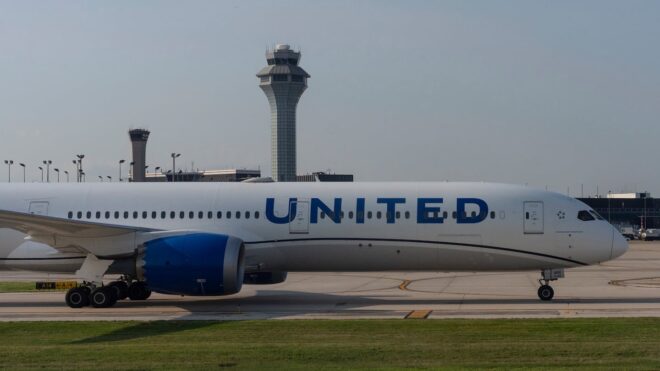
United Airlines, one of the largest airlines in the world, is currently under scrutiny following the introduction of a new sick leave policy that has sparked controversy among employees and labor unions. This policy, which is perceived by many as restrictive, has prompted investigations and raised questions about its implications for workers’ rights and the airline’s operational efficiency. The issue has attracted significant media attention, highlighting broader concerns about labor practices in the airline industry.
Background
United Airlines operates a vast network of domestic and international flights, with thousands of employees, including pilots, flight attendants, ground staff, and administrative personnel. Like many companies in the aviation sector, United has faced challenges related to labor costs, fluctuating demand, and the need for operational efficiency. In response to these pressures, the airline introduced a new sick leave policy intended to reduce absenteeism and ensure staffing levels remain consistent.
The New Sick Leave Policy
The new sick leave policy, implemented earlier this year, includes several key changes that have raised concerns among employees:
1. Stricter Documentation Requirements: Employees are now required to provide medical documentation for any sick leave lasting more than a single day. This documentation must be submitted within a specified timeframe, often within 24 to 48 hours of the absence.
2. Reduced Accrual Rates:The rate at which employees accrue sick leave has been reduced, meaning that employees accumulate sick leave days more slowly than before.
3. Cap on Sick Leave Days: The policy introduces a cap on the number of sick leave days an employee can accumulate, potentially affecting those with chronic health conditions or long-term illnesses.
4. Incentives for Attendance: The policy includes attendance incentives, such as bonuses or additional vacation days, for employees who do not use their sick leave over a certain period.
Employee and Union Reactions
The response from employees and labor unions has been overwhelmingly negative. Many employees feel that the new policy is overly restrictive and punitive, potentially discouraging workers from taking necessary sick leave. The requirement for medical documentation, in particular, has been criticized as burdensome, especially for those with limited access to healthcare.
Labor unions representing United Airlines employees have been vocal in their opposition. They argue that the policy undermines workers’ rights and could lead to a culture of presenteeism, where employees feel compelled to work while ill, potentially compromising their health and the safety of passengers. Unions have called for a reconsideration of the policy, emphasizing the need for a balance between operational efficiency and employee well-being.
Investigations and Legal Challenges
In response to the backlash, several labor unions have filed complaints with the National Labor Relations Board (NLRB), alleging that the new policy violates labor laws by imposing unfair restrictions on sick leave. The NLRB has initiated an investigation to determine whether United’s policy infringes on workers’ rights under the National Labor Relations Act.
Additionally, some employees have filed lawsuits against the airline, claiming that the policy discriminates against individuals with disabilities or chronic health conditions. These legal challenges argue that the policy violates the Americans with Disabilities Act (ADA) by not providing reasonable accommodations for employees with legitimate health issues.
Impact on Employees
The new sick leave policy has had significant impacts on United Airlines employees. Many report increased stress and anxiety related to the fear of disciplinary action for taking sick leave. This has led to concerns about mental health and the potential for burnout among staff who feel unable to take necessary time off.
The policy also disproportionately affects lower-income employees who may lack access to affordable healthcare and cannot easily obtain the required medical documentation. This group is particularly vulnerable to the negative impacts of the policy, as they may feel compelled to work while ill, risking their health and the health of others.
Implications for United Airlines
United Airlines faces a challenging situation as it navigates the fallout from the new sick leave policy. The scrutiny and potential legal challenges could damage the airline’s reputation and affect employee morale. The policy’s impact on employee well-being may also lead to increased turnover, absenteeism, and reduced productivity, ultimately affecting the airline’s operational efficiency.
The situation highlights the delicate balance airlines must strike between cost control and employee satisfaction. As labor costs continue to rise and competition intensifies, airlines like United are under pressure to find ways to improve efficiency without compromising worker rights or morale.
Industry Context
The controversy surrounding United’s sick leave policy is not unique to the airline. The aviation industry as a whole faces similar challenges related to labor costs, staffing shortages, and the need for operational efficiency. Airlines worldwide have been exploring various measures to address these issues, including changes to sick leave policies, attendance incentives, and flexible scheduling.
However, these measures must be implemented carefully to avoid negative repercussions. Airlines must ensure that policies are fair, transparent, and compliant with labor laws to maintain employee trust and morale.
Conclusion
United Airlines’ new sick leave policy has sparked significant controversy and scrutiny, highlighting the complex challenges faced by the aviation industry. As the investigation by the NLRB continues and legal challenges unfold, the airline must carefully consider its approach to labor relations and employee welfare.
Balancing operational efficiency with employee rights and well-being is crucial for maintaining a positive workplace culture and ensuring long-term success. The outcome of this situation will likely have implications for the entire airline industry, serving as a reminder of the importance of fair and equitable labor practices in a highly competitive and demanding sector.